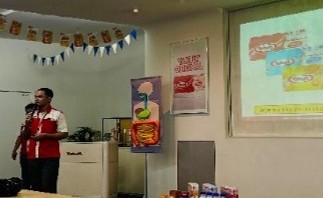Increasing public awareness of probiotics and environmental issues through the promotion of fermented beverage products
DOI:
https://doi.org/10.53088/penamas.v5i3.2161Keywords:
Probiotics, Fermented Beverages, Environmental Awareness, Plastic Waste Management, Community ServiceAbstract
This community service activity aimed to raise public awareness regarding the health benefits of probiotics and the importance of environmental responsibility in managing plastic waste. Awareness of healthy lifestyles, especially in the consumption of functional foods like probiotics, is still relatively low among Indonesian students. Although probiotics are proven to support digestive health, many still perceive fermented drinks such as Yakult as regular beverages without recognizing their health value. Additionally, plastic waste from product packaging remains an environmental issue. This program implemented a practical and educational approach through socialization, field observation, and an industrial visit to PT Yakult Indonesia Persada in Mojokerto on June 24, 2025. The activity involved 120 participants aged 18–30, including students and young educators. They received information about probiotics and health, observed the production process, and learned about sustainable waste management based on the 3R (Reduce, Reuse, Recycle) principles. The results showed increased knowledge and motivation among participants to adopt healthier and more environmentally conscious behavior.
References
Abubakar, A. A., Al-Mamary, Y. H., Preet Singh, H., Singh, A., Alam, F., & Agrawal, V. (2024). Exploring factors influencing sustainable human capital development: Insights from Saudi Arabia. Heliyon, 10(16), e35676. https://doi.org/https://doi.org/10.1016/j.heliyon.2024.e35676
Berame, J. S., Lumaban, N. W., Delima, S. B., Mercado, R. L., Bulay, M. L., Morano, A. B., & Parohinog, C. D. M. G. (2022). Attitude and behavior of senior high school students toward environmental conservation. Biodiversitas, 23(10), 5267–5277. https://doi.org/10.13057/biodiv/d231036
Cantika, L. C. N. M. L., Dewi, P., & Purnama, F. D. D. M. F. (2025). Sosialisasi Untuk Meningkatkan Kesadaran Masyarakat Akan Pentingnya Bakteri Baik Dalam Minuman Yakult. ASAWIKA: Media Sosialisasi Abdimas Widya Karya, 10(1), 18–21. https://doi.org/10.37832/asawika.v10i1.200
Cerdó, T., García-Santos, J. A., G Bermúdez, M., & Campoy, C. (2019). The Role of Probiotics and Prebiotics in the Prevention and Treatment of Obesity. Nutrients, 11(3). https://doi.org/10.3390/nu11030635
Compare, C., Pieri, C., & Albanesi, C. (2022). Community–University Partnership in Service-Learning: Voicing the Community Side. Journal of Higher Education Outreach and Engagement, 26(2), 79–102.
Dong, H., Rowland, I., Tuohy, K. M., Thomas, L. V, & Yaqoob, P. (2010). Selective effects of Lactobacillus casei Shirota on T cell activation, natural killer cell activity and cytokine production. Clinical and Experimental Immunology, 161(2), 378–388. https://doi.org/10.1111/j.1365-2249.2010.04173.x
Khennouf, T., Bouchefra, A., & Idoui, T. (2023). In Vitro Evaluation Of Probiotic Potential Of Lactiplantibacillus Plantarum Trg1 Isolated From An Algerian’s Goat Rumen. Journal of Microbiology, Biotechnology and Food Sciences, 13(2), 1–6. https://doi.org/10.55251/jmbfs.4278
Masrikhiyah, R., Widya Prasetya, H., Ubaedillah, U., Ferry Balfas, R., & Yulianingsih, S. (2020). Peningkatan Pengetahuan Mengenai Manfaat Pangan Probiotik dan Prebiotik Bagi Kesehatan. JAMU : Jurnal Abdi Masyarakat UMUS, 1(01). https://doi.org/10.46772/jamu.v1i01.316
Matera, M. (2024). Bifidobacteria, Lactobacilli... when, how and why to use them. Global Pediatrics, 8, 100139. https://doi.org/https://doi.org/10.1016/j.gpeds.2024.100139
Matung, R., & Kumara, I. N. I. (2024). Pelatihan Kesehatan Masyarakat Melalui Sosialisasi Gaya Hidup Sehat di PT Yakult Indonesia Persada. Jurnal Pengabdian UntukMu NegeRI, 8(3), 513–515. https://doi.org/10.37859/jpumri.v8i3.7538
Puspitasari, C. A., Yuliati, L. N., & Afendi, F. (2021). Pengaruh Green Marketing, Kesadaran Lingkungan Dan Kesehatan Terhadap Keputusan Pembelian Produk Pangan Organik Melalui Sikap. Jurnal Aplikasi Bisnis Dan Manajemen, 7(3), 713–722. https://doi.org/10.17358/jabm.7.3.713
Sari, A. E. . (2021). Edukasi Manfaat Probiotik Dan Prebiotik Pada Masyarakat. Jurnal Mitra Masyarakat (JMM), 2(1), 39–43. https://doi.org/10.47522/jmm.v2i1.51
Sarita, B., Samadhan, D., Hassan, M. Z., & Kovaleva, E. G. (2024). A comprehensive review of probiotics and human health-current prospective and applications. Frontiers in Microbiology, 15(January), 1–14. https://doi.org/10.3389/fmicb.2024.1487641
Trifosa Veronica, M., Ilmi, I. M. B., & Crosita Octaria, Y. (2022). Kandungan Gula Dalam Minuman Teh Susu Dengan Topping Boba. Amerta Nutrition, 6(1SP), 171–176. https://doi.org/10.20473/amnt.v6i1sp.2022.171-176

Downloads
Published
How to Cite
Issue
Section
License
Copyright (c) 2025 Ni Nyoman Puspa Sari, I Gusti Agung Ayu Candra Mulyadewi, Putu Ayu Diah Wijayani, Komang Widhya Sedana Putra P, Ni Wayan Lasmi

This work is licensed under a Creative Commons Attribution-ShareAlike 4.0 International License.
Authors who publish with this journal agree to the following terms:
The author(s) retain copyright and grant the journal the right of first publication with the work simultaneously licensed under a CC BY-SA 4.0 license that allows others to remix, adapt, and build upon the work even for commercial purposes, as long as they credit the author(s) and license their new creations under the identical terms.
License details: https://creativecommons.org/licenses/by-sa/4.0/
Most read articles by the same author(s)
- Priskylia Jenia Fidyariska, Komang Widhya Sedana Putra P, Ni Wayan Lasmi, Integrating sustainability values through a workshop on utilizing environmentally friendly materials at SDN 6 Padangsambian Klod as a waste management solution , Penamas: Journal of Community Service: Vol. 5 No. 1 (2025): Penamas: Journal of Community Service


